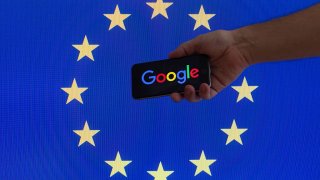
- Wednesday's verdict can be appealed and taken to the EU's highest court.
- This is not the first time that the EU's General Court has ruled on an antirust case brought by the European Commission and directed at a tech giant.
- The European Union is currently discussing how to toughen its rulebook to ensure fairer competition across the 27 member nations.
The EU's General Court ruled Wednesday that the European Commission was right in fining Google for an antirust breach — in what represents a landmark moment for EU policy which could impact the business models of major tech players.
Watch NBC6 free wherever you are
>The ruling comes after the European Commission, the executive arm of the European Union, said in 2017 that Google had favored its own comparison shopping services and fined the company 2.42 billion euros ($2.8 billion) for breaching antitrust rules. Alphabet-unit Google contested the claims using the EU's second-highest court.
"The General Court finds that, by favoring its own comparison shopping service on its general results pages through more favorable display and positioning, while relegating the results from competing comparison services in those pages by means of ranking algorithms, Google departed from competition on the merits," the court said in a press release Wednesday.
Get local news you need to know to start your day with NBC 6's News Headlines newsletter.
>In addition, the court also confirmed the fine at 2.42 billion euros. "The General Court concludes its analysis by finding that the amount of the pecuniary penalty imposed on Google must be confirmed," the court added.
Wednesday's verdict can be appealed and taken to the EU's highest court.
A spokesperson for the European Commission said via email, "Today's judgment delivers the clear message that Google's conduct was unlawful and it provides the necessary legal clarity for the market."
Money Report
The spokesperson added: "The Commission will continue to use all tools at its disposal to address the role of big digital platforms on which businesses and users depend to, respectively, access end users and access digital services."
Following the ruling, a Google spokesperson told CNBC via email: "Shopping ads have always helped people find the products they are looking for quickly and easily, and helped merchants to reach potential customers."
"This judgement relates to a very specific set of facts and while we will review it closely, we made changes back in 2017 to comply with the European Commission's decision."
The legal precedent
This is not the first time that the EU's General Court has ruled on an antirust case brought by the European Commission and directed at a tech giant.
The chamber ruled in July 2020 that the commission had failed to prove that the Irish government had given a tax advantage to Apple — this was after the Brussels-based institution ordered the Republic of Ireland to recoup 13 billion euros from the iPhone maker in 2016.
The court ruling marked a significant blow to Margrethe Vestager, the EU's competition chief, and her team. It essentially said they didn't do a good job in proving their case.
Vestager decided to appeal the decision, pushing it to the EU's highest court, the European Court of Justice, where the case is yet to be ruled upon.
At the time, the ruling from the General Court also shone a light on one of the main challenges for European competition policy: In antitrust cases, it's the commission that has to bear the brunt of the evidence and not the defendant.
Impact for Big Tech?
The EU is currently discussing how to toughen its rulebook to ensure fairer competition across the 27 member nations.
Thomas Vinje, an antitrust partner at law firm Clifford Chance, believes the General Court's ruling "will put the wind in the sails of the DMA [Digital Markets Act]."
He added via email Wednesday, "The judgment is a vindication of the Commission's persistence over a decade in putting a stop to Google's abuses."
The DMA is one of the big legislative pieces that the EU is working on and which, when approved, will look to tackle any behavior that closes off European markets. It could lead to changes in parts of the business models of the tech giants.
One of the potential changes is ending self-preferencing — when, for instance, app search results on an Apple product display options developed by the tech giant. The idea is to give smaller app developers the same chance of being found and chosen by consumers. Legislators are also looking at restricting target advertising to bring more privacy to users. This could also affect how Big Tech operates.






